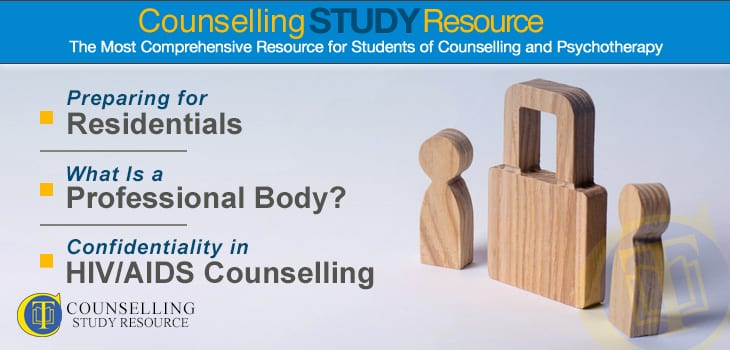104 – Confidentiality in HIV/AIDS Counselling
Preparing for Residentials – What Is a Professional Body?
In episode 104 of the Counselling Tutor Podcast, Ken Kelly and Rory Lees-Oakes discuss residentials that form part of counselling courses. In ‘Practice Matters’, Rory then talks about the differences between professional (or ethical) bodies and awarding bodies. The podcast ends on a discussion about confidentiality in HIV/AIDS counselling, specifically about whether or not you should break confidentiality if a client with HIV or AIDS discloses to you that they are having unprotected sex.
Preparing for Residentials (starts at 1.54 mins)
It is often around this time of year that counselling students go away for a residential weekend, perhaps to a hotel or other setting.
People may have different feelings about this event – for some, it may be the highlight of the year and very exciting; others may feel nervous and daunted by the idea of spending this intense time with others.
Ken and Rory offer tips on how to approach your counselling residential in order to make the most of it:
- Try to look upon the residential as a time for reflection, offering you a chance to get to know yourself and your group members better.
- Personal development and self-awareness are key to being a safe and effective counsellor: your residential offers an unusual opportunity for personal reflection and processing.
- Your peers might in future – once you are all qualified – refer clients to you, and you to them. Taking the time to really get to know them therefore might make good business sense too.
- Residentials give you an opportunity to learn more about your own triggers and danger areas for possible transference.
- Try to note down as much as you can: this will be valuable material for your personal-development assignment.
- Watch your alcohol intake – it can be easy to drink too much in the evenings and detract from what you get out of the following morning.
- Alcohol can also lead participants to disclose more than they would normally choose – Rory refers to this as ‘in vino veritas’ (Latin for ‘in wine lies the truth’!).
- Be prepared to feel emotionally drained afterwards, so build in some good self-care for immediately afterwards if possible.
- When you return home, be mindful that your loved ones will not have experienced what you have.
In short, counselling residentials can really shift your perceptions in a life-changing way – but do take good care of yourself.
What Is a Professional Body? (starts at 13.58 mins)
Rory describes the various professional bodies (sometimes known as ‘ethical bodies’) overseeing counselling and psychotherapy in the UK, talking about what they are, how they function and who they service.
There are as many as 14 different professional bodies in the UK that look after our profession in its broadest sense. He also clarifies the differences between professional and awarding bodies.
Breaking Confidentiality in HIV/AIDS Counselling (starts at 24.10 mins)
Breaking confidentiality is a complex issue that arises regularly in its various forms in our Facebook group (where you’ll find over 23,000 others involved in the world of counselling and psychotherapy).
This particular question relates to confidentiality in HIV/AIDS counselling, or whether you should break confidentiality if you become aware, as a counsellor, that a client of yours who has HIV or AIDS is having unprotected sex.
First, it’s very important to differentiate here between HIV and AIDS: HIV is the virus (having which doesn’t make the person ill), while AIDS is the illness that can develop from this virus.
While the advent of HIV seemed very frightening at the time – partly through the limited treatment options available at that time (meaning it really was then a death sentence), and partly through poor handling by the UK authorities – there are many people now living well with HIV who may never go on to develop AIDS.
Ken also describes his perspective on HIV as a young person growing up in South Africa.
Above all, it is important not to criminalise people with HIV/AIDS, and a private counsellor would not automatically break confidentiality if they knew a client was having unprotected sex – just as they would not do so if a client had venereal disease and was doing so.
Ultimately, adults have the choice to insist on using a barrier method of contraception. It would, however, be different if someone with HIV/AIDS was going out with the express intention of infecting others.
However, when you work for an agency, you must follow its policies, including on confidentiality – so do ensure that you know this policy inside out, for your clients’ and your own protection. If in doubt, ask your managerial supervisor there about confidentiality in HIV/AIDS counselling – ideally by email, so that you have a written record of their response.
Talk to your clinical supervisor too about any such ethical dilemmas. Your professional body should also be able to help about confidentiality and HIV ethical issues.
A good source of high-quality information on HIV/AIDS is the Terence Higgins Trust; the British Psychological Society has also published guidance on psychological support for adults living with HIV.


